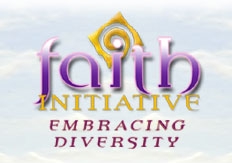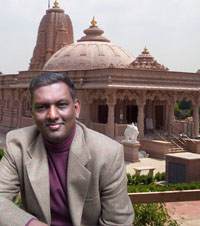
Faith Initiative
The Secular And The Sacred
 Boundaries: Usually they are man-made. Think of borders, subjects, categories - we love separating and breaking up that which is whole and inter-connected. We often take the boundary as permanent and real. Why should the secular and sacred be separate categories? For me as a Jain, this distinction was never an issue until I started to be educated in the West, where religion was a separate box, and usually outside of science and reason. This is when I first encountered the boundary, and have struggled ever since.
Boundaries: Usually they are man-made. Think of borders, subjects, categories - we love separating and breaking up that which is whole and inter-connected. We often take the boundary as permanent and real. Why should the secular and sacred be separate categories? For me as a Jain, this distinction was never an issue until I started to be educated in the West, where religion was a separate box, and usually outside of science and reason. This is when I first encountered the boundary, and have struggled ever since.
The more I think about it, this sense of classification and categorizing is the root cause of the problem. Man, woman - classifications, but also they are both similar as humans/spirits. We have physical borders and boundaries - a classification of territory, which can and does lead to territorialism. Secular and the sacred are divisions - as if a knife is cut through a holistic larger truth. The mind is borderless, so why do we create borders and classifications?
Boxes help us to organize and order our knowledge. For many, religion is best kept in a box, lest it might interfere with science. The Indian word for religion is ‘dharma’ which means the science of sustainable living. Dharma was not supposed to be dogma, nor was it supposed to be fixed on a scripture - it was an evolving Universal science of truth and wisdom which was both secular and sacred - it was literally unclassified truth. I often feel upset that modern journalists, trained in secular ways, often see all religions with a ‘Christian’ lens - there has to be a church, a bishop, Sunday worship, a bible, a code of conduct. This is so far from the truth, but where does one begin when a journalist has so little time to think or reflect?
As with knowledge, so with practical life. Knowledge is divided into subjects like history, geography, biology, etc. Practical life is divided into home, work, family, school, play, study, holidays, and dare I say it community? Why should home life be separate from work? Why should family be separate from community? Can the sacred not influence our learning, home life and our business and work ethics?
I tried to integrate all this in a magazine I founded and published for seven years - Jain Spirit. It covered a range of topics which directly related to contemporary life like Art, Workplace, Inter-Faith, Lifestyle, Youth, Worship … little did I realize that I was returning Jain dharma to its origins where it informed and infused all aspects of life. I am now working in the Diversity field through my firm Diverse Ethics, and the biggest battle I am facing is these classifications - am I into race equality or gender equality, what about other categories like disability, sexuality, age… I explain that I am not into these and my approach is to draw from the wisdoms of the world and build bridges of understanding. In my book ‘Celebrating Diversity’, I devote a whole chapter to the topic of cultivating a borderless mind entitled ‘Minds Wide Open’.
Classifications help us organize and can have many practical uses. However, their limitations easily get forgotten - as the famous philosopher Alfred North Whitehead said, we often mistake the map for the territory. One of the beauties of faith perspectives is that they tend to be broader in outlook and inclusive of nature, of art, knowledge and even social life and history. In ancient India, education was holistic and students were taught all subjects in an inter-related way such that the approach was to understand truth in all its contexts. It was also often one to one - guru and shishya - the teacher and the disciple. And yes, even spiritual teachers taught science, history, geography and the arts. All was seen as key to learning and personal development. Even inter-faith was never seen as such as there were no boundaries between faiths - Buddhist and Jain monks had debates about liberation and the destiny of the soul, without it being classified as inter-faith dialogue. It was simply a pursuit of truth and wisdom.
Mahatma Gandhi claimed that ‘Truth is God’. For modern scientists, Truth is science and God is untruth. Mahatma Gandhi integrated science and spirituality and showed the world how one can live a holistic life and use the virtues to bring about social change. He called his mission for independence ‘Satya Graha’ - the quest for truth. Why did he not call it ‘removal of the British’ or ‘quest for independence’ - he saw truth as the larger timeless goal, and it was the truth of India that it should govern itself in its own way, using its own logic, whatever the imperfections.
Ask a secondary school student what is their favourite subject and many would say ‘World Religions’. Why? Because they are diverse, colourful, artistic and show different approaches to ethics and personal goals and aspirations. Unfortunately, the subject is rarely encouraged and even the teachers who can teach it are few and far between. Also Christian Schools do not want to encourage the study of World Religions as it somehow goes against the view that there is only One God and One Truth. All seekers for truth suffer from this mono-theism. My daughter did Hinduism at GCSE purely through her own efforts and resourcefulness. And she is a Jain. For the rest, the compulsory subject was Christianity.
As I write, I am leaving for the Hindu Navratri festival, the festival of nine nights, where women fast and come in the evening to offer the choicest foods to the Gods and dance in gratitude for the divine light of wisdom. The hall is full of colour with beautiful sarees, and the dancing is totally open and democratic - anyone can participate. Everything is shared - the music, the food, the fun and even the aarti is done collectively. Is this a religious festival - sure it is. Is this a secular festival - why not? Many young people come purely for the dancing and the music, and my nine year old son loves the sacred food - rarely are they spiritual, but they still look forward to the event and have a ball. One does not need to have a belief to enjoy the festival, but there are sadly many who say that they would not come because they cannot participate in any religious ceremony. How sad.
Instead of the sacred or the secular, we are better off focusing on truth and wisdom. May our eyes and ears be open to seek it everywhere. May we overcome our own limitations of pride, egoism, ignorance and dogmatism to explore and see truth in all its dimensions. Our world will be better for it.